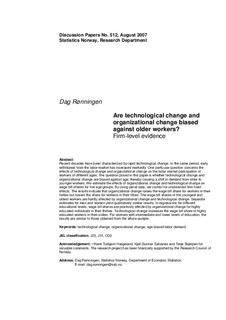Are technological change and organizational change biased against older workers? Firm-level evidence
Working paper

Åpne
Permanent lenke
http://hdl.handle.net/11250/180293Utgivelsesdato
2007Metadata
Vis full innførselSamlinger
- Discussion Papers [1003]
Sammendrag
Abstract:
Recent decades have been characterized by rapid technological change. In the same period, early withdrawal from the labor market has increased markedly. One particular question concerns the effects of technological change and organizational change on the labor market participation of workers of different ages. The question posed in this paper is whether technological change and organizational change are biased against age, thereby causing a shift in demand from older to younger workers. We estimate the effects of organizational change and technological change on wage bill shares for five age groups. By using panel data, we control for unobserved firm fixed effects. The results indicate that organizational change raises the wage bill share for workers in their forties but lowers the share for workers in their fifties. The wage bill shares of the youngest and oldest workers are hardly affected by organizational change and technological change. Separate estimates for men and women yield qualitatively similar results. In regressions for different educational levels, wage bill shares are positively affected by organizational change for highly educated individuals in their thirties. Technological change increases the wage bill share of highly educated workers in their sixties. For workers with intermediate and lower levels of education, the results are similar to those obtained from the whole sample.
Keywords: technological change, organizational change, age-biased labor demand